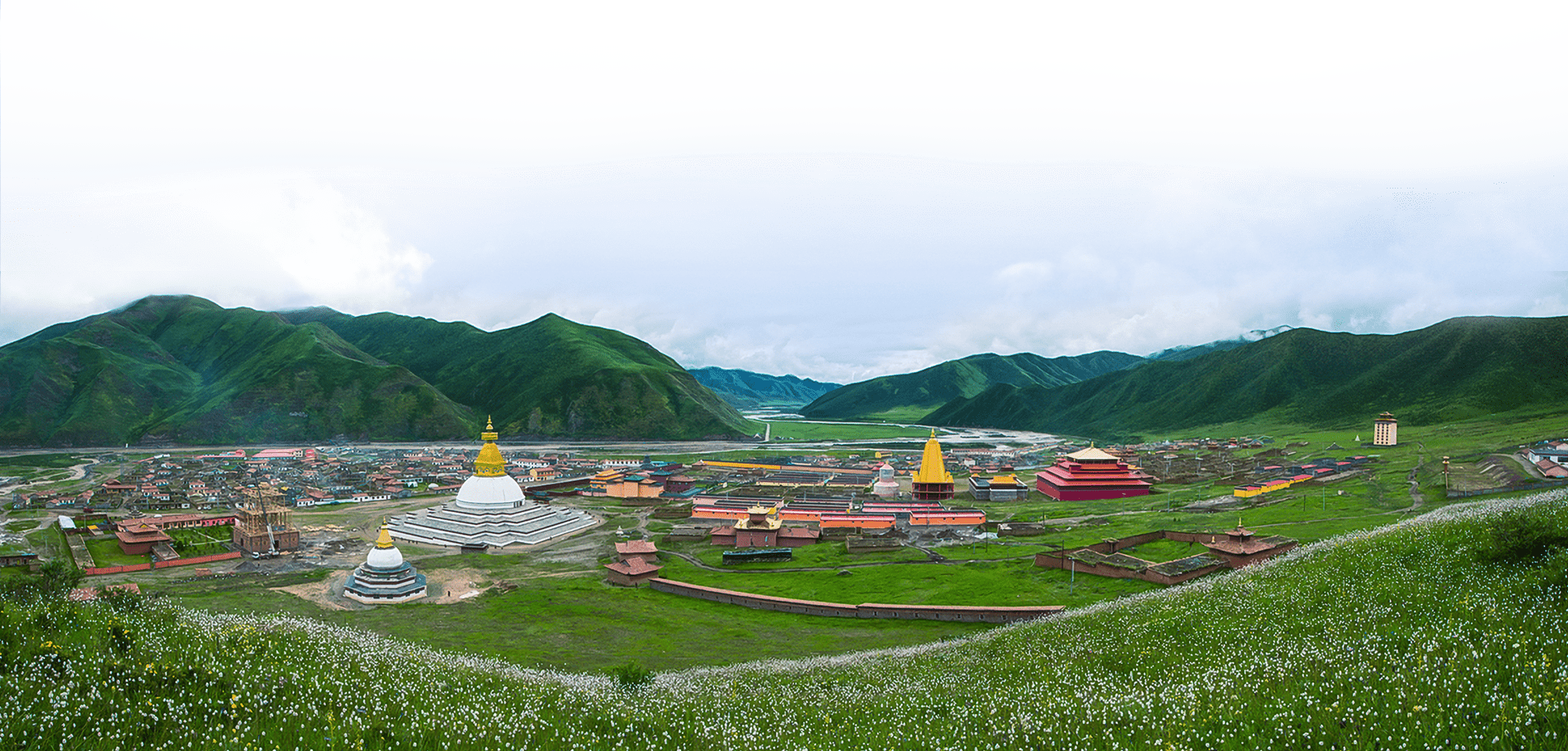Dharma, Relics, Guru
My dear Dharma friends
with whom I am connected by karma, prayer, faith and commitment.
These years you have with pure motivation, physical and mental hardship and difficulties, and expenditure have come to receive my teachings, help me, and show me kindness, and I have, with a pure motivation, taught you the Dharma, cared for you kept you in my mind, and done daily recitations and prayers for you. In this way there has formed the beginning of a good auspicious connection between us, and a good auspicious connection in the middle. The adornment of a concluding auspiciousness is for your lives to be in accord with the Dharma. This is not something that we do against our wishes, that we are forced to do, or been tricked into doing, but something we are all doing sincerely on the basis of our karma and prayers. As this is something we are doing sincerely, we are practicing the Dharma with aspiration, altruism, love, and kindness.
Through the power of karma I was born in Tibet, the land of snow, which is rich in fierce bitter winds and poor in oxygen and warmth. Distinctive features of my life were that till the age of ten I had never seen a vegetable. During those years my food was primarily yoghurt in the summer and tsampa in the winter. I was just an ordinary nomad boy growing up in a small area far away from anywhere. In terms of my environment and education when I was little, I was just a boy who was a nomadic herder and I knew of nothing else. However, the wheel of the power of indescribable karma has brought me from there to become a little flower on a mountain range protected by the warmth of your kindness.
Because of my environment and the circumstances I lived in while I was a boy, I was to encounter perfect conditions for Dharma practice. Even though the upheaval of the times was traumatic, even as boy my nature continued to be kind and loving, and I longed for the bodhicitta with great aspiration and joy, like a child longs for its mother. This appears to the because of the karmic tendencies and familiarization in previous lives that we believe in. The conditions I lived in when I was little are difficult to conceive of unless I could directly show them to you. Nevertheless, because of the power of my karmic tendencies, the good qualities in my nature could not be lost or destroyed. The power of habitual tendency has now brought me in this direction and to this path. We can call this the power of karma but this is primarily the increase of the power of habitual tendencies. I see this clearly.
This is an indication that in my previous life I have developed the habitual tendency for the Dharma.
It is karma and prayer that have brought us together. I am just one person, with one nature and one personality. While you trust in me and consider me worthy to follow as a teacher, there are others who do not see me as worthy to be followed as a teacher. This is because of the power of karma and prayers. It doesn’t make me any better because you hold me in esteem, and it doesn’t make me any worse when others don’t. You don’t suffer any loss in following me as out master, and those who follow another master don’t gain any more by it. Their minds have the same afflictions as before, so that they are sometimes unhappy, sometimes jealous, and so on, just as they always were, and still they experience the same problems in life that they did before and in the same way you remain sometime unhappy, sometimes jealous and you are no worse off than they are.
I travel back and fore, collecting donations to help my temple and monastery. Other lamas are also doing the same thing collecting funds for temples and monasteries. I still continue with my work of preserving the culture, establishing schools, giving medicine to the sick, giving food and clothes to the poor, spreading education among the people, and so on and so I am doing more than others, and this is evident it’s not just empty boasting.
There are some who are called lamas, tulkus, or khenpos who use donations to support their own families and so on. When I see what they do it makes me laugh. I look upon them with derision when I see them bringing people onto a path of aversion and attachment, praising themselves and criticizing others.
Our goal in the Dharma is to cut through and suppress fixation on the self and selfishness, so how can doing the opposite —praising and praising oneself and criticizing others—be following the Dharma?
Everyone teaches that we all have to rely on a teacher and all agree that we need to have excellent faith.
You all know the story in The Words of My Perfect Teacher, about the old woman who became enlightened through a dog’s tooth. If you can be the same as that old woman, then I can be like the dog’s tooth. If no relics come out of me, then you have not become like the old lady. If you do become like the old woman then relics will definitely come from me. However, my relics are not like the little spheres made of bone, they are the teachings of the Dharma that comes from the Dharma treasure in my throat. The Dharma of scripture and realization are the true relics of the Buddha and the teaching of the awareness of emptiness and luminosity are the relics of the dharmakāya, which are the kings of relics. When these are given to you, whether or not you obtain the siddhis depends on you. The Buddha has said, “Know that your liberation depends on you.” In that way, it depends on your own enthusiasm, diligence, and faith.
If your faith in the lama is genuine, you will have a view that is the same in your mouth and in your heart. It is the conduct where what you say and think are the same. If you have a good outer appearance of practice but deep inside you have doubts and think of receiving Dharma from another lama than your own and think, “If my lama doesn’t teach something I can get it from another lama and it will be the same,” then you don’t have genuine devotion, and though you practice hard there will be little benefit from it. That is the way things are.
This present time is an age of prosperity, Therefore lamas, tulkus, and khenpos all say “Don’t le your head be turned by material wealth” but their own heads are pretty much turned by it. This is not just a crucial factor in Tibetan Buddhism alone, but is also in southern Buddhism, Chinese Buddhism, Vietnamese Buddhism and Buddhism in the west. In all dharma lineages there are monks and nuns who still engage in business after their ordination and so on, and this is because they have fallen under the allure of material wealth.
They teach the Dharma in a time that is based on material wealth as their basis, and so now it is normal that they teach Dharma and give various empowerments and reading transmissions, spreading their teachings without any concern over whether they have the foundation for that Dharma, whether they have the lineage, whether they have practiced it or whether they have pure commitment to the Dharma and lama. Not only do some lamas in Tibet not do any practice at all themselves, but also without knowing what Dzogchen means they claim to teach Dzogchen. There are many like that in China and elsewhere and they have also appeared in America.
Some lamas have turned against their own lama, have rebelled against them, and yet they play the role of being important lamas. They give Dharma teachings to people who know very little about the Dharma and the important qualities of a Dharma teacher. This is one of the signs that we are living in bad times.
In my tradition, one practices properly the successive stages of the preliminary practices, have unchanging faith in the lama and then receive instructions on the nature of the mind. You should know that if a lama points this out earnestly and seriously, teaching again and again about this foundation, and doesn’t teach any profound Dharma until this is established in their minds, that is a sign of the lama’s genuine affection for his pupils.
Patrul Rinpoche has taught that it is meaningless to request profound Dharma teachings without first establishing a foundation. Without the necessary preparation receiving profound Dharma teachings will not be of any benefit and there is the definite danger that eventually one will not be able to recognize what the deep meaning is.
Hungkar Dorje, written in America December 2013.









